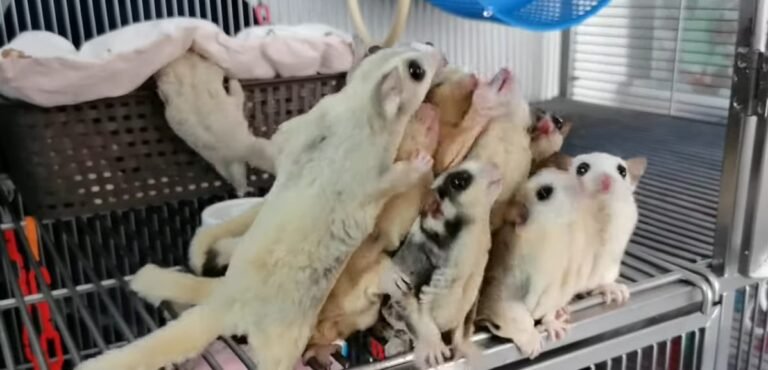What Can Sugar Gliders Not Eat
What Can Sugar Gliders NOT Eat?
Sugar gliders are adorable and fascinating pets to have. They require a balanced diet to ensure their health and well-being. While there are many foods that sugar gliders can eat, it’s essential to know what they should avoid. To keep your furry friends happy and healthy, here are some foods that sugar gliders should not eat.
Chocolate and Caffeine
Chocolate is a delicious treat for humans but can be toxic to sugar gliders. It contains theobromine, a substance that is difficult for them to metabolize. Ingesting chocolate can cause various health issues for sugar gliders, including vomiting, diarrhea, increased heart rate, and even seizures. Similarly, caffeine should be avoided as it can have similar effects on their small bodies.

Fruits and Vegetables with High Acid Content
While fruits and vegetables are generally considered healthy, some have high acid content that can be harmful to sugar gliders. Citrus fruits like oranges, lemons, and grapefruits fall into this category. The high acid levels can cause digestive upset, mouth sores, and diarrhea in sugar gliders. Other fruits to avoid include kiwi and pineapple. Additionally, vegetables like tomatoes and rhubarb are acidic and should not be fed to sugar gliders.
Processed Foods and Junk Food
Just like humans, sugar gliders should not consume processed foods and junk food. These foods are often high in sugar, salt, and unhealthy fats, which can lead to obesity, dental issues, and other health problems in sugar gliders. It’s best to stick to a diet consisting of fresh, natural foods.
Dairy Products
Sugar gliders lack the necessary enzymes to digest lactose, a sugar found in dairy products. Feeding them dairy can result in gastrointestinal issues like diarrhea, bloating, and stomach discomfort. It’s best to avoid dairy altogether when it comes to sugar gliders.
High-Fat Foods
High-fat foods, such as fried or greasy foods, can cause digestive issues and lead to obesity in sugar gliders. They require a balanced diet that consists of proteins, fruits, vegetables, and a minimal amount of healthy fats. Feeding them high-fat foods can have serious consequences for their health.
Nuts and Seeds that are High in Fat
While nuts and seeds can be a good source of protein and healthy fats for humans, some varieties are not suitable for sugar gliders. Certain nuts, such as almonds, cashews, and pecans, have high-fat content that can be difficult for sugar gliders to digest. Macadamia nuts, in particular, are toxic to them and should be avoided at all costs. Stick to safe options like plain unsalted peanuts and walnuts in moderation.
Onions and Garlic
Onions and garlic may add flavor to our meals, but they can be harmful to sugar gliders when ingested. They contain toxic substances that can damage their red blood cells and lead to anemia. It’s crucial to keep foods containing onions or garlic away from your sugar glider’s reach.
Sugary and Sweet Foods
Sugar gliders have a high sugar tolerance, but that doesn’t mean they should be fed sugary or sweet foods regularly. Excessive sugar intake can lead to obesity, dental problems, and other health issues. Avoid feeding them candies, cakes, cookies, and other sweet treats.
Alcohol and Carbonated Drinks
Alcohol is highly toxic to sugar gliders and can have severe effects on their liver and central nervous system. Even a small amount can be fatal. Carbonated drinks, like soda, can cause bloating, gas, and other digestive issues in sugar gliders. It’s best to avoid these beverages altogether.
In conclusion, it’s essential to provide a balanced diet for your sugar gliders to ensure their well-being. Avoid feeding them chocolate, caffeine, high-acid fruits, processed foods, dairy products, high-fat foods, certain nuts and seeds, onions, garlic, sugary foods, alcohol, and carbonated drinks. By sticking to a healthy diet, you can help your sugar gliders live a long and happy life.
Frequently Asked Questions
1.What should I feed my sugar gliders instead of the foods they can’t eat?
When it comes to feeding your sugar gliders, it’s best to provide a balanced diet that consists of fresh fruits, vegetables, proteins, and a minimal amount of healthy fats. Here are some safe options to include in their diet:
– Fruits: Apples, bananas, grapes, strawberries, and melons (in moderation)
– Vegetables: Carrots, bell peppers, green beans, and leafy greens
– Proteins: Cooked chicken, eggs, and mealworms
– Healthy Fats: Small amounts of unsalted nuts like peanuts and walnuts
2.Can sugar gliders eat insects?
Yes, sugar gliders can eat insects. Insects, like mealworms and crickets, can be a good source of protein for them. However, it’s essential to ensure that the insects are gut-loaded, meaning they have been fed a nutritious diet themselves before feeding them to your sugar gliders. This ensures that your pets receive the necessary nutrients from the insects.
3.Can I give my sugar gliders treats?
Yes, you can give your sugar gliders treats, but it’s important to choose the right ones. Opt for natural, sugar-free treats specifically made for sugar gliders. These treats are formulated to meet their nutritional needs without risking their health. Avoid giving them sugary human snacks as treats, as they can be harmful to their well-being.
Final Thoughts
Taking care of sugar gliders involves more than just providing them with a comfortable living environment. Their diet plays a significant role in their overall health and longevity. By avoiding the foods mentioned above and offering them a balanced diet, you can ensure that your sugar gliders live a happy and healthy life. Remember to consult a veterinarian or a sugar glider specialist for more specific dietary recommendations based on your pet’s individual needs.







